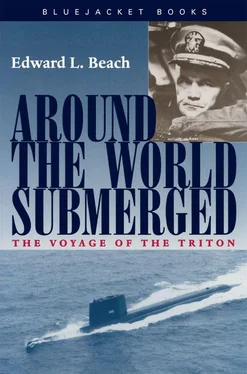But time spent in fruitless worry could do no good. Restlessly, I began to wander about the ship.
Almost the first person I ran into was Poole, up and fully dressed, his head buried in the innards of one of the radar receiving sets in Triton’ s air-control center.
“How are you feeling?” I asked.
“Fine, Captain,” he replied, “I feel swell. I think it’s all over now.”
I didn’t recall Poole as being a particularly placid individual, and something about his bearing, perhaps his half-shut, sleepy eyes, seemed not exactly normal. I found Jim Stark in the ship’s pharmacy and put the question to him.
“What you’re seeing, Captain, is the after-effects of the dope he’s been given during the last twenty-four hours,” said Jim.
“You mean he’s still hopped up? He looked just the opposite,” I said.
“No, what I mean is that the effects of the medication haven’t worn off yet. That’s why he seemed a bit strange. He’s not himself at all. But he feels fine, and maybe he’ll be free of the kidney stone attacks from now on. We can only wait and see.”
“Then what’s he doing up and working?” I said.
Jim grinned. “Well, Captain, I’m not very far away from him, and don’t plan to be.” Jim indicated a little tray containing a hypodermic needle and several small bottles. “All this stuff here is Poole’s.”
“Good man, Jim,” I nodded approvingly. “But why is he working? We don’t need him that badly, do we? Is it because all the other radar technicians are out working on the fathometer?”
“Nobody has put Poole to work, but he wants to. As long as he wants to be up and working and doesn’t overdo it, it’s the best thing for him. That’s why I’m sticking around.”
I nodded again. “I get it.”
As I left the pharmacy, I glanced into the air-control center once more. All I could see of Poole was a rear view. His head and forearms were deep inside the radar console in quest of some stray electron or grid voltage somewhere.
In the control room, I found that what had been the passageway was now a blueprint reading room. A long, blueprinted diagram of the sonar equipment had been laid out on the passageway deck, and grouped around it on their hands and knees were Lieutenants Rubb and Harris and Electronics Technicians Docker and Simpson. Had the blueprint been a green-felt cloth, I might almost have expected to hear the rattling of dice and low-voiced incantations soliciting the favor of Dame Fortune.
Despite their ridiculous posture, however, these four gentlemen were in dead earnest. Both ends of the compartment were marked, “No Passageway—Men Working.” Crew members needing to go from one end of the ship to the other were required to drop down a deck and pass through the crew’s mess hall immediately beneath the control room.
Jim Hay now had the dive, and he had crowded as close as possible to the planesmen in order to leave room for Beckhaus and McDaniel, who were apparently taking readings on the fathometer cabinet itself.
One of the unwritten rules in the submarine service is that men engaged in important work do not throw down their tools and snap to attention merely because the Commanding Officer happens around. Only Dick Harris rose to greet me.
“We’ve found out a couple of things, Captain,” he said, “and there may be more than one thing wrong with the fathometer.”
I nodded. This was about what I had expected.
“One thing is that the gear is running too hot. There’s a ventilation motor in it which is supposed to be running at all times, but it was hooked up wrong and apparently hasn’t been working. So there’s a transformer burned out and at least one, maybe two, crystals are gone. But I still can’t explain the reduced sensitivity in the fathometer head itself. That’s what has me worried.”
This was, of course, disturbing news; but compared to what was perhaps going on in the after part of the ship, where Don Fears and his engineers were wrestling with their problem, it was not the worst I had heard this day.
“Keep me informed, Dick,” I said. “Maybe we can at least keep the sound head from getting any worse.”
Dick nodded as I left, probably both relieved and surprised that I had not questioned him further. A glance at Jim Hay’s diving crew and the instruments before them showed me that Triton was rock steady at the ordered depth and still at ordered speed. Here, at least, things were under control.
Of all the urgent things on my mind at this moment, the condition of the engineering plant was the most critical. I could stay away from it no longer.
I can recall a feeling of resolution as I walked swiftly toward the engineering spaces; this was what Triton was built for. Even though we had to shut down one plant—even though we might have to keep it shut down for the entire remainder of our cruise—there was no reason why the other should have the same bad luck. We could and would carry on. This was the traditional Navy way, and it was, I knew, what Admiral Rickover would have had us do, was in principle what he had himself directed when the prototype of USS Nautilus, out on the flats of Idaho, had made that famous full-power simulated run across the Atlantic Ocean.
When I joined the engineer group, I could see that the news was not good. Don handed me the sheet of paper on which the latest readings had been logged. They were similar to the ones I had seen earlier, but higher.
“We can’t figure it out, Captain,” he said. “This just doesn’t add up, but here they are!”
“Were they taken by the same person?” I asked.
Don shook his head. “I thought of that, too,” he said. “These are an independent set taken by another man.”
Gloom deepened. Everyone fully understood the implications of the situation.
“What do you recommend, Don?” I said, knowing what it must be.
Don looked back squarely. “We’ve gone over every reading, every bit of the instructions, and all the prints. We’re logging another set of readings right now with a third man taking them. I would have taken them myself, but I wanted to stay here to check over what we’ve already got. We’ll just have to keep checking until we’re sure, until we know exactly what’s happened. We haven’t hit the limit yet.”
The whirring of the main turbine and the great throb of the reduction gears sounded as though nothing could ever disturb them. But this was not so. A minor dislocation somewhere else, in some important control circuit perhaps, down in the reactor space where we could not get to it, could still them at any time.
My face must have mirrored the gravity of my thoughts. A bell tingled. The telephone. Someone answered it, listened briefly, handed it to me.
“It’s for you, sir.”
The caller was Harris, with good news.
“We’ve found the trouble with the fathometer, Captain, and I think we have the right parts on board. We’ll have her going again in a couple of hours.”
This was, at least, a weight off my mind. We would be approaching shoal water shortly, and would need this piece of equipment.
“Good, Dick,” I said. “Tell your people that was a fine job, and I’m very much relieved and grateful.”
“Will do, Captain,” Dick said, sounding pleased.
I hung up. “Well,” I said, “that’s one problem solved. The fathometer’s OK, anyway.”
But our somber mood could not be lifted for long. Triton’ s machinery was too well designed, her research engineers and builders too careful for anything to go wrong. And yet, the evidence could not be denied. Instinctively, I realized, we were all waiting for the check observations, even then in the process of being taken. But we all knew what the results must be.
Читать дальше












